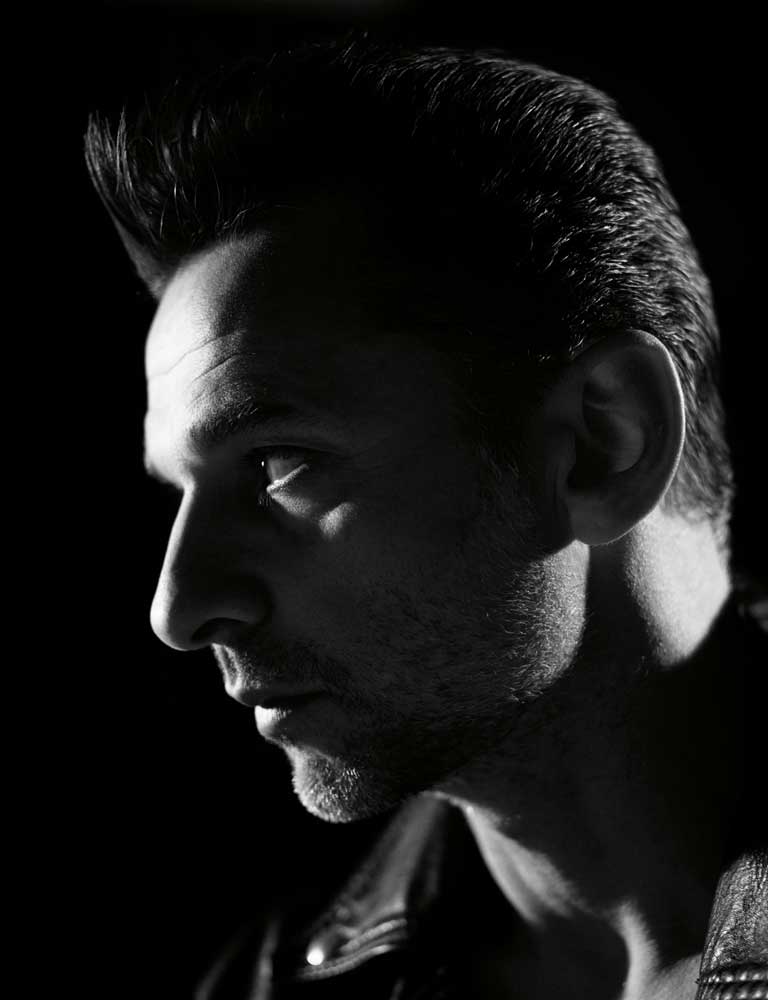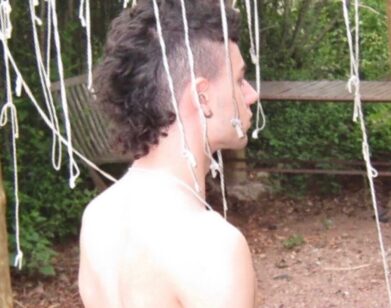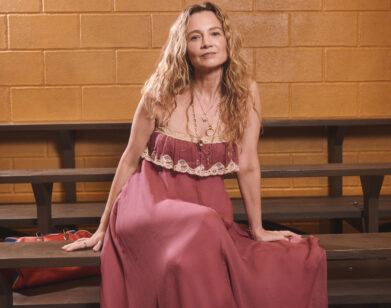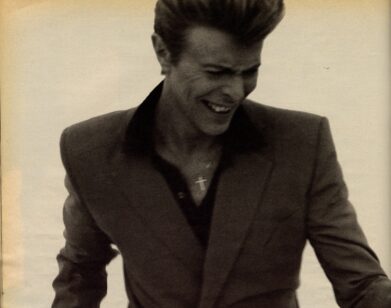Dave Gahan
He calls them the Black Swarm. That’s the nickname that front man Dave Gahan has given those particularly obsessive fans who seem to devote their entire lives to following Depeche Mode. Gahan and his bandmates, Martin Gore and Andrew Fletcher, who formed Depeche Mode in 1980, make music for outcasts. But considering the group’s extreme popularity over the past three decades, the Black Swarm may indeed outnumber the normal folks. The magic of Depeche Mode goes way beyond new wave. They write songs that are big enough to serve as arena chants but have all of the twisted personal emotion of diary entries (many fans would choose the 1986 album Black Celebration as the soundtrack of their youth). Last spring, Gahan, Gore, and Fletcher released their 12th full-length album, Sounds of the Universe, and set off on a global tour that was quickly sidelined when Gahan fell ill with a stomach ailment. But the Black Swarm need not despair: The group is back on the road and plans to be through the end of the year.
Actress Chloë Sevigny is a die-hard Depeche Mode fan. She discovered the band’s music in her early teen years in Connecticut, and a poster of Gahan occupied prime real estate on her bedroom wall. Here she talks to the 47-year-old singer about how lonely outsider teenagers become very popular adults.
DAVE GAHAN: Hi, Chloë.
CHLOË SEVIGNY: Hi! You’re not in New York?
GAHAN: No, unfortunately. I’m in London right now. We just rehearsed.
SEVIGNY: You’re preparing for the tour . . . You know, I tried to go see Depeche Mode 101 when I was a kid. I was in, like, junior high.
GAHAN: You must have been about 5 or something. [laughs]
SEVIGNY: I was not! I was about 14 or 15. I listened to a lot of music growing up. My father kept very current, and then I had my older brother. But Depeche Mode was the first band that was my own. It was my discovery.
GAHAN: Oh, cool.
SEVIGNY: But I couldn’t raise enough money to buy the concert tickets. My babysitting pay wasn’t really doing the trick. So there was this kid that hung out at the park where I grew up. He was kind of like Damone from Fast Times at Ridgemont High. Do you remember that character? He would sell concert tickets and pot and whatever else. This guy drove a Honda CRX with a WDRE bumper sticker. I went over to his car and was like, “Do you have any tickets for Depeche Mode?” He said, “Yeah, they’re some-odd dollars.” I didn’t have enough so he said, “If you give me a hand job, I’ll give you the tickets.”
GAHAN: Oh! No way.
SEVIGNY: I didn’t know what that was then, believe it or not. So I went back to my friends who were in another car and was like, “He said he’d give them to me if I gave him a hand job.” My friends said, “No! Don’t do it!”
GAHAN: Oh, my god.
I think Depeche Mode music somehow appeals to the oddball, to the person who is looking for something a little bit different. Dave Gahan
SEVIGNY: So I never got to see 101, but I saw you guys many times after that. One of my favorite parts about seeing you live is what you do between song lyrics onstage. You do this thing where you move the microphone away from your face and you murmur to yourself or say something.
GAHAN: [laughs] Yeah, I do, yeah.
SEVIGNY: I was always curious what you’re saying. Do you feel limited by the songs, like you have to break out of the song a bit?
GAHAN: You’re onto something there. Actually, I thought about that yesterday when we were performing, because I also do my solo stuff. I kind of put together a separate band with the guys I knew from Los Angeles: Martyn LeNoble, who plays bass with me and comes from Porno for Pyros, and Victor Indrizzo, my drummer, who was with Beck. It’s very different from Depeche stuff, where everything is really settled and in place. I’m kind of the wild card—I’m that part of the band. And sometimes I get frustrated with the limits that I’m confined to. The way it works is very structured.
SEVIGNY: But those moments onstage are so dynamic.
GAHAN: That’s the animal in me. That’s the animal breaking out of the cage.
SEVIGNY: Another large part of the live shows is the fact that they become sing-alongs. The crowd gets to chant. Can you hear the crowd from the stage? Is it loud?
GAHAN: Oh, yeah. I mean, I don’t use in-ear [monitoring] like a lot of people use live. I still have live monitors. I’m kind of old-school. I have to feel the audience. I enjoy that feeling of community. There’s something sort of spiritual about it in a lot of ways. It’s like we’re all doing this together. You can really hear the people—especially at some of the gigs we’re going to be playing on tour. We started in Tel Aviv, where we played in a huge football stadium like when we played 101. But it’s like that all across Europe. We’ve never actually done a whole stadium tour like this, so it’s gonna be pretty crazy. I know some of those gigs are gonna be wild.
SEVIGNY: What are the best cities in terms of fans?
GAHAN: L.A. is always great. There’s something special about L.A. And New York, for me, because it’s home. There’s nothing quite like walking onstage at Madison Square Garden.
SEVIGNY: I saw you at Madison Square Garden.
GAHAN: I think I always kind of try that much harder because it’s home. I have a sense of duty there. But L.A.’s great. It’s different all over Europe. Like in Italy, everybody sings, and not just during the songs, but chants in between them—a whole football field. Milan is great. Paris is fantastic. London is tough—everyone’s a bit too cool for school.
SEVIGNY: Yeah, I’ve been to shows there. I’ve felt that.
GAHAN: It feels like when I come to London, the big gates close on me. It’s not my home. But Poland’s crazy, Prague is great, Budapest . . .
SEVIGNY: Do you think it’s the kids who are alienated who come to those cities that especially embrace the band? I feel like there is much more passion from the degenerates, the outcasts . . .
GAHAN: That’s always what it’s been. It’s always been the kids who weren’t so included in school—where something wasn’t quite right, and they weren’t like the other kids.
SEVIGNY: Yeah, I remember what that’s like.
GAHAN: I remember, when I was a kid, I could fake it pretty good. I had lots of different groups of friends. There were kids that sort of went to gigs and discos, the kids that hung out on the street and stole cars and stuff like that. I never stayed long enough for anyone to really get to know me, and that seems to be a bit of a pattern in my life. I think Martin [Gore] and I were both like that. We grew up with similar backgrounds. We both had stepfathers who we thought were our dads but weren’t. We grew up in a similar sort of distrusting way. So, you know, there are a lot of people like that out there—and I think Depeche Mode music somehow appeals to the oddball, to the person who is looking for something a little bit different.
SEVIGNY: But for a band that appeals to the outcast, you’ve sold a gazillion records.
GAHAN: There are a lot of freaks out there. [both laugh]
I still hold on to the idea that a record can really change the way I feel. It’s the only thing that does that instantly—you know, without consequences.Dave Gahan
SEVIGNY: I wanted to ask you about the genesis of the twirling microphone. When did you start that? It captivates all of us ladies.
GAHAN: Well when it all began, before Martin would come down and play guitar with me, it was very much me on my own. Then eventually there was Alan [Wilder] and Fletch [Andrew Fletcher] and Martin, all up in their pods playing with the electronics and stuff. And I was down in front on my own. So I had to create my own little world. I mean, it was fine when we were playing little clubs and theaters. But all of a sudden it was, like, 200-foot stages that just felt so empty. That’s when I started to go into my own world and act out each song physically as well as with my voice. So the microphone stand became my partner . . . my dancing partner.
SEVIGNY: It’s so beautiful, the way you dance with it. Don’t you get dizzy with the twirling, or do you do it like a ballerina, where you look at one place?
GAHAN: I defy gravity, yeah. I don’t know how I stand up sometimes, but it can get a little out of control. It actually takes a few gigs to get into that again. It’s weird. There are different things in my performance that just kick in. Like if I don’t do certain things, it doesn’t feel like I’m doing a proper job.
SEVIGNY: That you’re not giving it your all.
GAHAN: I can’t go back now. When I started out I was like a shoegazer. I was terrified—I’m still terrified, but I just do a better job at covering that up. Years ago, when I was in my late teens, the best I could do was cling onto the microphone and stare at the floor. But over the years I’ve developed a way to use my body that helps.
SEVIGNY: I was reading online a bit, and you hinted at some songs that you might be playing in the new tour. And I was wondering if there was a chance you’d play “Stripped.”
GAHAN: Yep. There’s a very good chance that you will be seeing that one. And some old stuff, too. We’ve been rehearsing “Strange Love” and “Master and Servant.” It’s a little weird doing those, actually.
SEVIGNY: When you go back to singing early songs, like “Enjoy the Silence” or “Blasphemous Rumours”—and those are very deep songs—do they take on a different meaning than they did when you were a young man?
GAHAN: Yeah. Certain songs like “Enjoy the Silence”—to me, it always fits anywhere. There’s something about that song that’s really timeless, and I never get bored or feel like I have to muster something up. There’s real audience participation to that song, too, which helps. “Stripped” is also a bit of an anthem, so the audience really goes along. It’s always like the song at the end of time.
SEVIGNY: It’s a tearjerker. [Gahan laughs] I know when I’ve done plays with a long run, I’ve discovered new things as I’m saying the lines over and over again every night. But you’ve played these songs thousands and thousands of times. It must be hard to find the passion.
GAHAN: I worry about that sometimes. If I ever felt that happening, I would just say we really can’t do this anymore. I wouldn’t want the band to hate it or teeter out into complete nostalgia or whatever. There can be something great about that as well. Like, I understand when people still go to see the Stones. I mean, I saw them in New York at the Beacon Theater when [Martin] Scorsese was doing his documentary, and I was blown away by how good they were. But at the same time I was thinking, Wow, I don’t want to be doing this when I’m that old. [laughs]
SEVIGNY: I feel like gradually, from the earlier records to now, the sounds have been getting, maybe not darker, but more masculine, less dancey. Has that been a conscious decision?
GAHAN: I think it kind of happened organically. Going in to make Sounds of the Universe, we had more songs written between us than we ever have, and we tried to record all of them and compile the album from that. I still think of an album being an album. I think of it as having two sides, and the first side’s got to begin and end, and then the other side starts. But I think for some of the songs, in terms of instrumentation, we went back to more retro, dancey stuff. Vocally, I really like going into the darker side of myself. I like the feeling of redemption in a song where you get lifted from this dark place by the music and the melody. Even if the lyrics are really dark and twisted, I like a melody that lifts you. Music can do that. I still hold on to the idea that a record can really change the way I feel. It’s the only thing that does that instantly—you know, without consequences. [laughs]
SEVIGNY: Can I ask a little bit about the stage clothes? Fashion is one of my big hobbies.
GAHAN: Yeah, I noticed that you always wear pretty terrific outfits.
SEVIGNY: I feel like in the early days you were wearing some Gaultier, maybe?
GAHAN: Yeah, I did. You’re right.
SEVIGNY: And Martin was more into the kind of S&M stuff. Did you ever have a designer who did your stage clothes, or did you dress up all on your own?
GAHAN: Oh, no, we just all did our own thing. We’re still kind of like that, too. Even if I sit down with someone to work out what I’m going to wear, the way I want my suits to look, whatever, I sit with them and we draw up pictures and I pick the fabrics. I like doing that. I actually went to art school and dropped out in the third year. But one of the subjects that I really stayed with the longest was fashion. It was probably because the only guys in the class were me and this other guy, Iver, and the rest of the class was girls, so we got a lot of the attention. SEVIGNY: [laughs] Who do you hire to make your suits?
GAHAN: On the last tour, Johan Lindeberg worked with me on the designs. For this tour, I worked with this girl in New York, April Johnson. She’s a stylist, and we sat down and drew up stuff. Martin’s also got some terrific outfits. But he’s dropped the wings. He thought it was time to put the wings away.
SEVIGNY: You guys both always had amazing looks, and the rest with their mock turtlenecks and long shorts and old leather jackets . . .
GAHAN: Yeah. I love the stuff in the beginning that we’d just get from thrift stores and put together. We really never had the money. If we ever did get some, the first thing we’d do is buy something expensive like a Jean-Paul Gaultier leather jacket or something. [laughs]
SEVIGNY: Do you wear the same thing every night, or do you mix it up?
GAHAN: I mix it up, I wear different things, but once I get into something that I really like, then I’ll have like four outfits done exactly the same, because I like to get into character for the whole thing. And once I get into it, it’s hard for me to jump out. I stay there. The thing about Depeche songs is that they’re so descriptive. For me, they tell some kind of story about a character who’s trying to redeem himself or to find something to believe in—some kind of faith or hope. We go about it in very destructive ways but hopefully come out the other side.
SEVIGNY: How many kids do you have?
GAHAN: I have a son who’s 21—he’s not so young anymore. He’s a man now. Then I have a 16-year-old stepson, Jimmy, and I have a 9-year-old daughter, Stella Rose.
SEVIGNY: I was wondering: One of Nick Cave’s sons is kind of modeling now, and he’s around, and, of course, there are all these young kids in New York who are sons or daughters of famous people—musicians or actors—and are kind of getting into the biz or being scenesters DJing and whatnot . . . Do you try to steer your own children away from that type of thing?
GAHAN: Yeah, my oldest son who lives in London is into music and he does his own thing and I know he wants to play music. He works for a promotion company. But my son in New York, Jimmy, he’s into basketball. It’s all about the Knicks.
SEVIGNY: I’ve never seen you at a Knicks game. I go all the time.
GAHAN: Oh, I’m at Knicks games sometimes. But Jim is always there. Playing basketball is a bit like being in a rock ’n’ roll band: It takes discipline to go out there and do something every night.
SEVIGNY: Being in a band is like being an athlete.
GAHAN: Yeah. I put on quite a show, and I pride myself on that. Because I go and see a lot of bands and sometimes I can feel let down. There are a few performers that I think are really great, like Nick Cave or Iggy Pop, who just throw themselves into the performance. But then you go and see people and they are so half-assed.
SEVIGNY: I get super starstruck. I met Siouxsie Sioux in London, and I couldn’t even—I mean, she’s so much of a hero and an icon to me.
GAHAN: I get a little intimidated by certain people like that as well. She’s pretty intimidating, Siouxsie. She’ll sort of slap you down pretty quick.
SEVIGNY: Talk about putting on a good show, too.
GAHAN: She’s great. I used to get really terrified by meeting people who I respected and liked. I met David Bowie once and I was terrified because I thought, what if I don’t like him? But he was really nice. We got on fine. I’m a big Bowie fan. I fall back on his stuff all the time. If I’m feeling a certain mood, I know I can put on Ziggy Stardust (1972) or Aladdin Sane (1973) and my mood will completely change. It just takes me to a place where I wanted to go when I was a teenager. It’s like where Bowie was, I wanted to go.
SEVIGNY: That’s why I think still performing the songs live even if you’ve done them a gazillion times is important to the fans. It brings them back to where they were as teenagers.
GAHAN: It’s true. That’s what I try to focus on as well. Like if I’m feeling a bit like I can’t do it tonight, or if I’m thinking about if they’ve got room service at the hotel or something [Sevigny laughs] and I drift off for a second and then I suddenly pull it back in, because it’s difficult to ignore Depeche Mode fans. They demand so much from you. That’s what a Depeche Mode show is. It’s a combined effort. And I always say it’s much bigger than us. It always has been. It’s like an entity, and it’ll be there long after we’re gone.SEVIGNY: And you have some crazy, fanatical fans.
GAHAN: Yeah. It gets a bit scary in some places. We call them the Black Swarm.
SEVIGNY: Oh, I like that! Morrissey calls his superfans the Irregular Regulars.
GAHAN: [laughs] We have the Black Swarm, and literally in Europe you’ll see them at every show. I don’t know what they do. They work, I guess, and then once we do a tour, they buy tickets for all the shows.
SEVIGNY: Do they hang around the hotel, too, and stuff like that?
GAHAN: Some of them. They’re pretty cool, so we try to take care of them. Some of them can get pretty nutty, but they’ve learned over the years that timing is really important. I mean, if I’m with my family, I don’t want any of that around. I feel very protective around my kids. The boys can take care of themselves, but around my wife and daughter it’s like, not now. If they cross that line, I can get a little testy.
SEVIGNY: When you say that the band takes care of them, do you mean you hook them up with tickets?
GAHAN: Yeah, especially some of the ones who are traveling. You know they haven’t got tickets and you try and get them sorted out. Sometimes we’ve put fans on trains or planes and stuff to get them to the next place.
SEVIGNY: The Black Swarm. I love that.
Chloë Sevigny is an Academy Award– and Golden Globe–nominated actress and a fashion designer. She can currently be seen on the HBO series Big Love.







